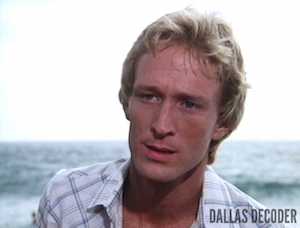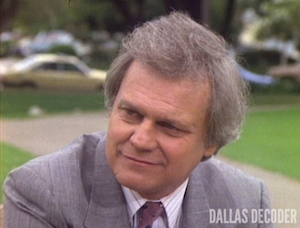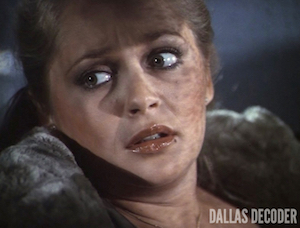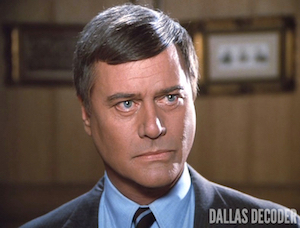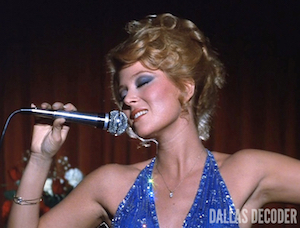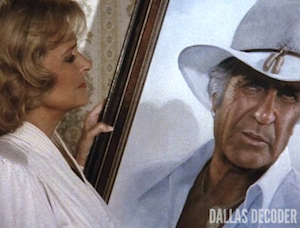
Frame love
The final scene in “Shadows” trembles with tension. Miss Ellie summons J.R. and Bobby to the Southfork living room, where she tells them she’s going to take down the painting of Jock that has hung there since his death. Ellie wants to make her new husband, Clayton Farlow, feel more comfortable in their home by moving the picture to the Ewing Oil offices. J.R. is adamant the portrait stay put. “You can’t do it, Mama. It belongs here,” he says. Ellie is equally resolute. She says the Ewings have mourned Jock “long enough,” then adds: “It’s time for this family to start again.”
Oh, the drama! You must admire “Dallas’s” ability to generate so much emotion over where to hang a picture, except things on this show are never that clear-cut, are they? Jock’s portrait has become a symbol of “Dallas’s” most essential themes — family, loyalty, tradition. That’s why Larry Hagman’s performance in this scene is so moving. Watch J.R.’s eyes. He looks more frightened than angry. For him, this is another example of how the world around him is changing. Cliff Barnes has become a successful oilman, Mama has married another man, and now Daddy’s picture is coming down. Despite the sharp tone J.R. takes with Ellie, Hagman manages to make his character seem vulnerable. He gets a big assist from Patrick Duffy, who only has three lines of dialogue, but whose expression lets us know how sorry Bobby feels for J.R.
If this scene isn’t as powerful as others involving Jock’s portrait (“Wendell, touch that painting and I’ll kill you where you stand!”), it’s probably only because Donna Reed is delivering Ellie’s lines instead of Barbara Bel Geddes. We watched Bel Geddes act opposite Jim Davis for years, and then we saw her character mourn his for another extended period. Bel Geddes made Ellie’s love for Jock feel real. Reed does a fine job in this scene, but it’s odd to see her standing in front of the picture and referring to Jock as her husband. On the other hand, Reed’s presence also adds something to the scene, at least when we watch it from J.R.’s point of view. After all, Mama must seem like a stranger to him at this moment.
The other moving scene in “Shadows” contains no dialogue. After learning that Bobby and Jenna have set their wedding date, Pam — clad in a satin robe — sits alone in her darkened bedroom. She gets up, walks to the dresser and picks up a framed picture of Mark, then sets it down and reaches for a bottom drawer, where she pulls out a picture of her, Bobby and Christopher. (It’s actually a publicity shot from the seventh-season episode “The Long Goodbye.”) Sitting on the floor and holding the picture to her chest, Pam sobs quietly. Victoria Principal is nicely understated here, and so is composer Bruce Broughton, who scores the scene with soft piano keys. It’s quite lovely.
“Shadows” also marks Christopher Stone’s final appearance as Dave Stratton, a minor character who nonetheless served a useful role. Stratton was Jeremy Wendell’s right-hand man, which made William Smithers’ character all the more mysterious and powerful. Wendell always seemed to be dispatching Stratton to deal with J.R. and Cliff, as if Jeremy had better things to do. I also was intrigued by the hint of attraction between Pam and Dave; I wonder if a romance between those two would have been a better subplot than having her chase Mark’s ghost? In a similar vein, “Shadows” is the episode where Sue Ellen suggests J.R. hire Jamie as a receptionist at Ewing Oil. As much as I like the idea of bringing another Ewing into the family’s workplace, imagine how this storyline might have played out if it were a character with a stronger connection to the show — like Lucy, or maybe Sue Ellen herself.
Speaking of J.R.: There’s a scene where he talks on the phone to a business associate and tells him he’d “like to start drilling around April 15 … for tax reasons.” Sheesh. Doesn’t J.R. know that’s merely a tax-filing deadline? The IRS would care only about income earned before December 31. Likewise, I’m a bit perplexed when Clayton and Ray jet to Houston to check on the Farlow business operations there. The men are supposed to fly home later that afternoon, but Clayton calls Ellie to tell her that he and Ray have decided to stay a few extra days. Gee, doesn’t Ray have to get back to the ranch? And since this was supposed to be a same-day trip, what will they do for clothing and toiletries?
I know, I know. These are very wealthy men. They’ll probably have no trouble acquiring some fresh underwear and a toothbrush, right?
Grade: A
_______________________________________________________________________________________________________________________________________________

Sympathy for the devil
‘SHADOWS’
Season 8, Episode 9
Airdate: November 23, 1984
Audience: 19.2 million homes, ranking 2nd in the weekly ratings
Writer: David Paulsen
Director: Gwen Arner
Synopsis: J.R. hires a private detective to learn Mandy’s identity. Sue Ellen urges J.R. to hire Jamie as a receptionist. Clayton confides in Ray. Naldo returns and tells Jenna he wants to see Charlie. Miss Ellie takes down Jock’s portrait, upsetting J.R.
Cast: Michael Alldredge (Steve Jackson), Martin Cassidy (Frank Carp), Roseanna Christiansen (Teresa), Pat Colbért (Dora Mae), Patrick Duffy (Bobby Ewing), Eric Farlow (Christopher Ewing), Linda Gray (Sue Ellen Ewing), Larry Hagman (J.R. Ewing), Jenilee Harrison (Jamie Ewing), Susan Howard (Donna Krebbs), Steve Kanaly (Ray Krebbs), Howard Keel (Clayton Farlow), Ken Kercheval (Cliff Barnes), Fredric Lehne (Eddie Cronin), Shalane McCall (Charlie Wade), Daniel Pilon (Renaldo Marchetta), Priscilla Beaulieu Presley (Jenna Wade), Victoria Principal (Pam Ewing), Donna Reed (Miss Ellie Farlow), Marina Rice (Angela), Deborah Shelton (Mandy Winger), Danone Simpson (Kendall), Christopher Stone (Dave Stratton), Charlene Tilton (Lucy Ewing), Deborah Tranelli (Phyllis), Kathleen York (Betty)
“Shadows” is available on DVD and at Amazon and iTunes. Watch the episode and share your comments below.










